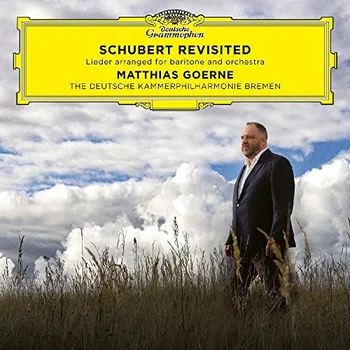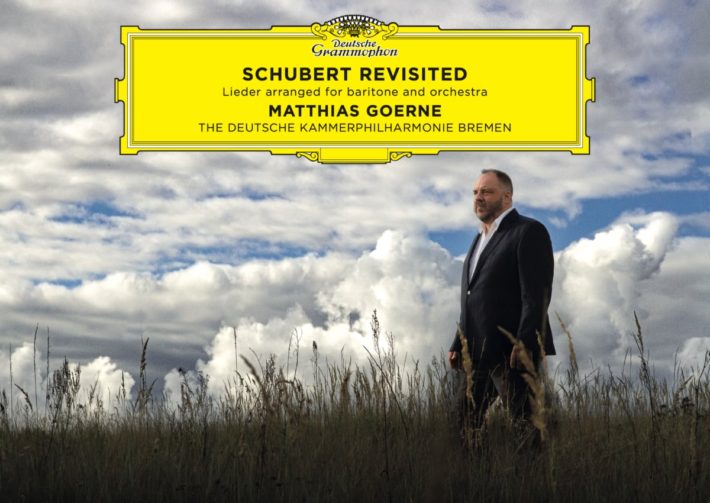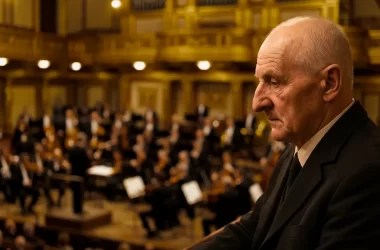Baritone Matthias Goerne’s new Schubert album offers a refreshing angle in his approach to the composer’s lied: while the original versions of songs like Erkönig derive their dynamism from a close interplay of voice and piano, Goerne has chosen to record selections for voice and orchestra arranged by his longtime pianist and collaborator, Alexander Schmalcz. In his foreword, Goerne remarks that he feels some arrangements are too texturally heavy to capture the intimacy of certain songs–something Schmalcz aims to consciously eschew through subtlety and simplicity.

Although I would have liked a less rushed tempo in the opening of Der Tod und das Mädchen (track 6), the arrangement itself uses winds in the hymnal textures to intriguing effect. The fullness of the piano’s chord is replaced by an openness that sounds almost hollow, as though to reflect the desolate circumstance. This sets up a stark contrast to the anguished (and expressively performed) lament of the maiden. In the second stanza, Goerne’s legatos evoke a certain reassurance in Death’s words, though the faster tempo again hinders a full appreciation of the connection between music and text. Dietrich Fischer-Dieskau’s version with Gerald Moore (1969) for me remains the gold standard in this regard.
Schmalcz’s orchestration of Erkönig (track 7) again reflects sensible instrumentation, such as the choice of double basses to represent the quintessential octave motifs in the piano version–though I admittedly still prefer the sweeping urgency and rawness of the original. Likewise, music in the major section (where the elf-king entices the child) has dainty and well-placed trills in the winds; they aptly portray the hope, and maybe even the irony of what are only to be disingenuous promises of joy. Goerne again is clearly at home in the orchestral context: his voice carries with richness and robustness in the most urgent sections; even in such moments (as you’ll hear in 2:26-2:33), there are some deft change-ups in color and timbre that only someone extremely familiar with the work is able to make.
Das Heimweh (track 13) offers plenty of instrumental variety to vivid programmatic effect. The strings provide the ambling lilt of someone walking and reminiscing but where the best transformations occur are in the second stanza. Here, we find Johann Ladislav Pyrker’s vivid descriptions of the scenery: listen to how the arrangement uses lighter wind textures to create a pastoral image in the allusion to fragrant meadows, but much fuller strings to evoke a heroic quality in the mention of ‘peaks of shattering height’. The nicely-conceived orchestration not only complements but elevates Goerne’s already narrative performance.
The inclusion of An die Entfernte (track 19) sets up an interesting comparison with another version Goerne has with pianist Helmut Deutsch on Harmonia Mundi: I was curious to see if and how the presence of the orchestral component would impact the singer’s approach to the lied; to some extent it has. In the recording with Deutsch, we get more arched, almost angular phrases at the beginning while in the ensemble account, he adjusts to the velvety instrumental timbres with more even-keeled phrasing. I did find the element of contrast between light and dark more salient in the piano version, though both showcase equally the baritone’s finessed approach.
Well-written liner notes accompany the solid performances: what I liked in particular were the descriptions of Goerne’s angle on orchestral adaptations, Schmalcz’s take on the transcription process, as well as the performance practice and its collaborative leadership duties taken on by the baritone and ensemble leader, Florian Donderer. Texts and translation are also properly provided. The sound engineering mindfully manages the balance between soloist and ensemble throughout: true to the original voice-piano arrangements, the voice remains front and center but at the same time, the important accompanimental textures are never lost.
This album not only (re)confirms Goerne as an exceptional interpreter of Schubert’s music, but also shows the success Schmalcz achieves in reconciling orchestral techniques and textures with what we hear in the original piano versions. An enthusiastically recommended listen for anyone looking for an insightful perspective on the lied genre.
Recommended Comparisons
Abbado | Davies | Fischer-Dieskau | Bostridge
Schubert Revisited: Lieder Arranged For Baritone & Orchestra
Matthias Goerne – Baritone
The Deutsche Kammerphilharmonie Bremen
Florian Donderer – Ensemble Leader
Deutsche Grammophon, DG 4839758



















